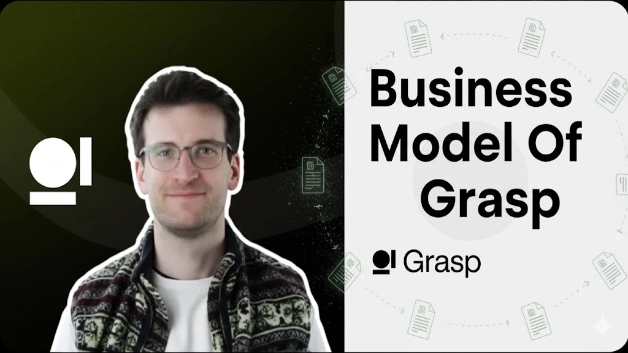| Category | Details |
|---|---|
| How Grasp Started | Business Model of Grasp: Grasp was Founded in 2020 by Richard Karlsson and Johan Devér (former McKinsey consultants) alongside Simon Hällqvist (former Ericsson AI engineer). The Stockholm-based startup emerged from founders’ firsthand experience with finance’s manual work burden—spending over 90% of analyst time on repetitive tasks like reading reports, building Excel models, and creating presentations. The trio recognized that while AI initially succeeded in text-centric fields like law, advances in multimodal processing could finally tackle complex finance workflows. The 25-person team developed proprietary multi-agent systems that coordinate specialized AI agents to automate competitive analyses, market mappings, and financial research that previously consumed weeks of analyst effort. |
| Present Condition | Grasp secured $7 million Series A funding led by UK-based Octopus Ventures with participation from existing investor Yanno Capital, bringing total capital to $9 million. Serving nearly 200 customers across 30 countries, including most Big Four consulting firms. Posted 3.5x annual recurring revenue growth over the past 12 months. Recently opened first international office in London, signaling European expansion. Technology handles multimodal tasks by connecting domain-specific AI agents to trusted datasets and productivity tools, delivering outputs that meet enterprise-grade quality standards. Current product automates buyer/target scans, competitive analyses, market research, and financial modeling—tasks finance professionals consistently describe as time-intensive yet essential. |
| Future of Grasp and Industry | Grasp‘s market projects explosive growth from $11.07 billion in 2025 to $90.99 billion by 2035 (26.2% CAGR), with finance and banking holding 22.3% market share. The broader AI agents market valued at $7.38 billion in 2025 reaches $103.6 billion by 2032 (45.3% CAGR). Financial services account for 20% of global AI spending increases between 2024-2028, with 85% of organizations integrating AI agents in at least one workflow by end-2025. Financial institutions report 38% profitability increases by 2035 through AI agent deployment. Studies show time savings of 65-86% versus human-only workflows, with enterprise cases reducing planning from five hours to 35 minutes using multi-agent systems. Positioned to automate 90% of knowledge work done by financial analysts as multi-agent coordination capabilities mature. |
| Opportunities for Young Entrepreneurs | Grasp is targeting specific professional workflows present massive opportunities as generative AI matures beyond general-purpose assistants. Enterprise sectors spending heavily on manual knowledge work (legal, consulting, accounting, research) need domain-specific automation that handles multimodal complexity. Building multi-agent architectures that coordinate specialized capabilities mimicking human team collaboration creates defensible competitive moats. Financial services invested approximately $35 billion in AI in 2023, seeking returns through operational efficiency as competitive pressures intensify. Google Cloud research confirms 77% of financial services executives achieve positive ROI within first year of generative AI deployment. Entrepreneurs with deep domain expertise combined with AI engineering capabilities can identify automation opportunities incumbents overlook. Patient capital from specialized VC firms supports long development cycles required for enterprise-grade systems. |
| Market Share | Operating in nascent vertical AI sector targeting $1.4 trillion investment banking and management consulting services market. Currently serving nearly 200 customers including most Big Four consulting firms, positioning the company as emerging category leader in finance workflow automation. 3.5x annual recurring revenue growth demonstrates rapid market penetration. Financial services AI adoption climbing from 55% to 78% within two years creates expanding addressable market as firms recognize productivity advantages. Currently pre-dominant profitability but scaling revenue through enterprise customer expansion and international growth. |
| MOAT (Competitive Advantage) | Proprietary multi-agent systems that coordinate specialized AI agents for end-to-end workflow automation—not just single-task assistance. Architectural breakthroughs enable agent collaboration at enterprise scale through orchestration layers mimicking human team dynamics. Data collection agents, analysis agents, and presentation agents work together producing outputs meeting finance professional quality standards. Founders bring rare combination: deep domain expertise from McKinsey consulting experience identifying automation opportunities plus technical AI capabilities from Ericsson engineering background. Four years of development created enterprise-grade systems handling multimodal complexity (presentations, PDFs, financial statements, market reports) competitors struggle to replicate. Customer validation from Big Four firms provides credibility barrier new entrants cannot easily overcome. Productivity improvements (25.1% faster task completion, 40% higher quality per Harvard studies) create retention moats as customers become dependent on efficiency gains. |
| How Grasp Makes Money | Grasp has SaaS subscription model selling access to multi-agent AI platform for investment banks and management consulting firms. Enterprise licenses priced based on user seats and usage volume. Revenue from automating high-value finance workflows: competitive analyses, market mappings, buyer/target scans, financial modeling, and research deliverables. Potential expansion into adjacent professional services verticals (private equity, corporate strategy, business development) using same multi-agent architecture. Future revenue opportunities from API access allowing customers to integrate automation capabilities into proprietary systems. Upselling advanced features and premium support packages to existing Big Four customer base. International expansion through London office creates additional revenue streams from European consulting firms and investment banks seeking productivity automation. Customer retention driven by demonstrated time savings (tasks compressed from weeks to minutes) and quality improvements validated through enterprise deployments. |
I’m Araib Khan, an author at Startups Union, where I share insights on entrepreneurship, innovation, and business growth. This role helps me enhance my credibility, connect with professionals, and contribute to impactful ideas within the global startup ecosystem.
